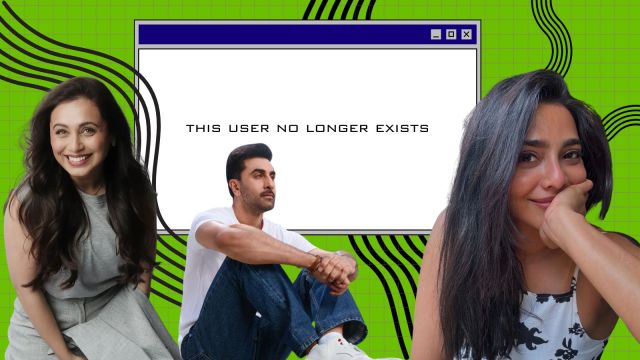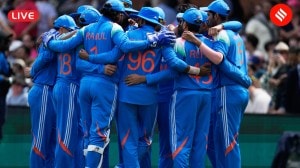Off the gram: Why more celebrities are choosing to disappear from social media
The famous have to put themselves out there. It’s an occupational hazard. It can be a win-win situation for both the celebrity and their fans. But sometimes, it doesn’t work as smoothly.
 Aishwarya Lekshmi joins a slew of actors who have stayed away from social media like Rani Mukerji and Ranbir Kapoor (Photo courtesy: Instagram/Canva)
Aishwarya Lekshmi joins a slew of actors who have stayed away from social media like Rani Mukerji and Ranbir Kapoor (Photo courtesy: Instagram/Canva)What might have been a dark or abrupt post sounded almost poetic in Aishwarya Lekshmi’s farewell message, bidding adieu to social media. The actor, known for her subtle and powerful performances in Malayalam and Tamil films, wrote in a thoughtfully crafted message that social media “has reverse-UNO-ed” and distracted her from her work. It had, she said, taken every original thought away from her, affected her vocabulary and language, and made every other simpler pleasure joyless.
Sparing a lone disparaging comment, most users on a Reddit thread were appreciative of her reasons. As much as the world seems to revolve around social media, people on it know the hassles that come with it, the traps and the risks, prompting them to virtually pat the ones who dare to leave. Aishwarya’s choice might have surprised many, but it isn’t unprecedented.
Celebrities log off
She has joined a slew of actors, writers, and others who have chosen to take breaks, if not entirely abstain, from social media. Among famous absences, withdrawals, comebacks, and short breaks are Aamir Khan’s abrupt departure in March of 2021, Rani Mukherjee’s and Ajith Kumar’s choice not to be on any networking platform, Hrithik Roshan’s detoxing break, and Fahadh Faasil’s revelation that he stopped using a smartphone. Some departures remained permanent. Sonakshi Sinha did not come back from her Twitter break, after a quick note calling it quits for the sake of mental peace.
Many of them admit to doing it for their mental health, aware of the ‘risk’ of losing out on promoting their work or appeasing the fans. Aamir Khan’s announcement was casually dropped in a message, almost like an afterthought: “In other news, this is going to be my last post on social media”. No grand reasons were offered, which inevitably brought on speculations that he must have found it affecting his privacy, coming as it did a day after his birthday, when he was swarmed with wishes. Hrithik took a short break this year and said it was like something in him “switched”. Fahadh said that he used a ‘dumb phone’, but he would, like Hollywood filmmaker Christopher Nolan, become an email-only person one day. Ranbir Kapoor has famously admitted to having a “secret” account for following others, but he doesn’t post anything. In several interviews, he has given multiple reasons for this, from not wanting to “be in the news” when he’s not releasing a film to being a “shy, introverted” person and not wanting the burden of maintaining an “entertaining persona” on social media.
The phenomenon is global. Actors, writers, and musicians across the world are known to stay away from online platforms, either out of a complete lack of interest or to protect themselves. While senior actors like Eddie Murphy and Brad Pitt have found no reason to log in and begin a new habit in this stage of their careers, younger celebs like Emma Stone and Saoirse Ronan have also found it easier to detach themselves from the fad. Emma quit Twitter in 2013 after her account was hacked, while Sairose simply thought people only knew her for the roles she played, and they would not want to know about her personal habits. Musicians like Ed Sheeran and Selena Gomez, too, have taken extended breaks.
“It may be important for a lot of people to have an online presence, for actors or writers to get public acceptance. But how do we evaluate if there is anything worthwhile positive that overrides the negative,” asks philosopher, educator, and writer Sundar Sarukkai.
It is not only about the vulnerability of being in a public space, but also about the risks of addiction, Sundar says. Some do leave to have more time for themselves, to work, to concentrate, to relax.
Why quit?
“People become stressed and anxious and they’d want to respond to everything so fast. There is a whole lot of instant emotion — instant anger and instant depression. It takes a huge toll on their mental health. From my experience of working with students, I know how they are affected. It decouples you from everyone around you. Social media draws them in so much that they stay hooked even when they are not enjoying it. That is how deep the addiction can be. You need to ask what cost you are paying for whatever benefit you are getting from it. Not just the celebrities, but every ordinary person should ask this,” Sundar says.
The famous have to put themselves out there. It’s an occupational hazard. There are, of course, merits of being in a virtual space, which allows them to be present for the fan, even if not physically. Fans can engage with their favourites (all those ask-me-anything sessions), forming what are called para-social relationships, as they watch real-time updates or take part in “live” interactions. In a win-win situation, the celebrities get another platform to announce and promote their new work. But sometimes, it doesn’t work as smoothly.
The virtual space gives a false sense of security, but nothing is abuse-proof on the internet. Words are grilled, photos are plucked and taken apart. Cyberbullying and abuse are not limited to controversial posts or visuals, but every little word or deed can invite trouble. This happens especially on social media handles of celebs who may take a stand or share an opinion about anything at all. Trolling has become the easiest tool to express disapproval, and sometimes criticism can turn into threats.
“What happens in the public discourse has become such an entitled thing that everyone thinks they can abuse everyone else even if they don’t know them, even if they have not read or known their work. In a world with no regulation of basic public politeness of various kinds, social media can become extremely toxic,” Sundar says.
While cyber laws have become stricter and address the abuse, the victims of the attack still go through a new kind of trauma. Not that the paparazzi of an earlier age were kinder — Princess Diana was driven to her death as she was chased by paparazzi. But cyberspace seems especially vicious, allowing a certain kind of sadism to take form, where abuse is done for pleasure.
Many celebrities have learnt to work around the system — keeping their posts professional and work-focused, often handing over their pages to managers or public relations teams. Others still find ways to connect more personally, sharing behind-the-scenes glimpses, vacation reels, or heartfelt birthday posts. The truth is, celebrities are often no different from the average user. Increasingly, many young people are also choosing to log off social media altogether to reclaim their time, protect their mental space, and escape the endless scroll. But when celebrities choose “internet obsoleteness”, there is a greater risk — as Aishwarya says, being “out of the gram is out of the mind”.





- 01
- 02
- 03
- 04
- 05


























